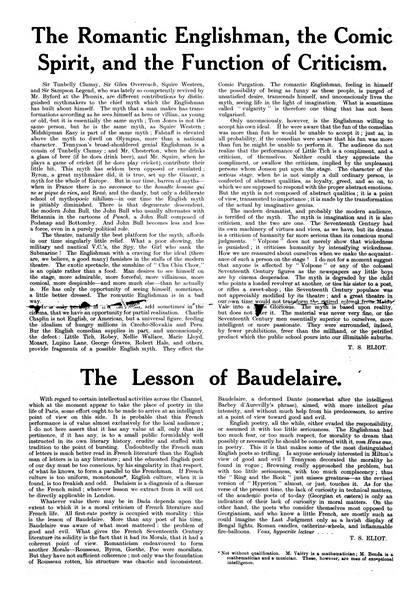In approaching this assignment, I decided to concentrate on Anglo-American writers and their criticism of current modernist literature. In my search, I was drawn to T.S. Eliot's "The Lesson of Baudelaire" from the first issue of The Tyro. Immediately, my eyes alighted on the phrase, "Dadaism is a diagnosis of a disease of the French mind" (Eliot, The Tyro Vol 1, p. 3). When I began reading the whole article, I expected a full denouncement of the dadaist movement, primarily because of his use of the word "disease" to describe it. Also, I expected him to maintain that the movement has no bearing on English literature at all. While proven wrong in my first assumption, the second was somewhat qualified by the rest of the article. Eliot believes that dadaism cannot be directly applied to London. However, what I wasn't expecting was Eliot's claim that French readers and writers are not only better read in French literature than English readers and writers, but better read in literature in general. And, additionally, he notes that English writers are too conscious of themselves to seriously consider any other type of literature, a notion with which he seems to disagree, given the nature of the article. I can only assume that he considers himself an exception to the rule (unless he places himself in a different category, since he's technically American?).
As someone who emulated Baudelaire in his own poetry, Eliot compares both modernist French Literature and English Literature as a whole to the author's work. While he seems to believe that dadaism is a part of modernism that does not apply to English literature, he does believe it should evaluated. However, his evaluation is qualified, contingent on whether or not it can be viewed as a "moral criticism" of French life. He then presents what he calls "The lesson of Baudelaire," which, briefly stated, is the idea that poetry should address moral issues and wrestle with the implications of good and evil. This, he appears to believe, is something that French authors have attempted to do for centuries, and which Baudelaire perfected.
At the end of his article, he adds a phrase in french, "Vous, hypocrite lecteur..." I surmised that this was probably calling the reader a hypocrite, perhaps because he anticipated an English reader or poet might believe he is being unfairly criticised.

Comments
Jeff Drouin
Wed, 02/09/2011 - 23:22
Permalink
Clarice, this s good, but can
Clarice, this s good, but can you please link to the pages you're discussing? Also, I wonder if "Vous, hypocrite lecteur" is a literary quote. Might be worthwile looking it up.
Clarice Butacan
Thu, 02/10/2011 - 03:34
Permalink
I just looked up the
I just looked up the quotation...it might be an allusion to a Baudelaire poem, "Au lecteur. "Hypocrite lecteur, -- mon semblable, -- mon frère!"
Jeff Drouin
Thu, 02/10/2011 - 12:33
Permalink
Just FYI, that line
Just FYI, that line "Hypocrite lecteur, -- mon semblable, -- mon frère!" also appears in T.S. Eliot's The Waste Land, which initially appeared in the first issue of The Criterion (October 1922), then in The Dial of November 1922, and then in book form in December 1922. It might be worth your while to look into The Waste Land and discourse about Baudelaire among these magazines.